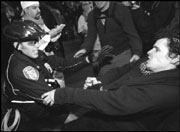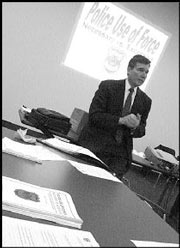“THIS IS THE END of a very long road,” Seattle City Council member Jim Compton announced Monday, as he introduced the legislation his public safety committee had been working toward for almost two years.
The council took two actions Monday: It passed an ordinance to install an additional 25 video cameras in Seattle police cars (bringing the number to 42 out of 223 cars), and it passed a resolution that would require police officers to fill out a form for every traffic stop they make. Both moves were responding to the public outcry over reports that revealed Seattle police give traffic tickets to far more African-American drivers than white drivers.
But it’s not over yet. In a surprise twist, neither of the votes can actually force the city to act, and both are subject to further police scrutiny.
Though the city attorney’s office hasn’t ruled on the matter, Marianne Bichsel, spokesperson for Seattle Mayor Greg Nickels, says that putting police cameras in cars cannot be legislated—it has to go through contract negotiations with the police guild because it represents a “change in working conditions.”
With the police chief, the guild, the mayor, and the City Council in support of the cameras, their use in some form is fairly certain. But the negotiations could change how the cameras are used and who controls the tapes. “We don’t want a fleet of lawyers going through (the tapes) looking for every discrepancy and making officer’s lives miserable,” says Ken Saucier, head of the guild.
As for data collection, Bichsel says that because the council only passed a nonbinding resolution, the mayor doesn’t have to implement the council’s will at all. “If,” said Bichsel, “in our discussions with the police chief, we find it’s not workable, we’re going to talk with the council about doing other things.”
Police Chief Gil Kerlikowske came out strongly against the council’s data collection resolution before the vote, claiming that “there is no clear plan for analysis and use of the data,” thereby leaving the system open to abuse and mismanagement.
Compton defended data collection on Monday, saying the resolution was specific enough and that state law required the city to do something. He also defended it as an important way to honor public demands put on the council for action. “It would be cynical in the extreme if we back away now,” he said.
But whether, and to what degree, the city backs away from preventing racial profiling isn’t totally the City Council’s choice. For now, more depends on what compromises can be reached with a hostile guild and a skeptical police chief than on the edicts of Seattle’s lawmakers.
Trevor Griffey








